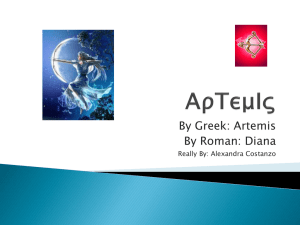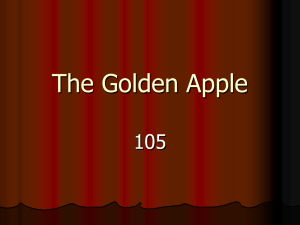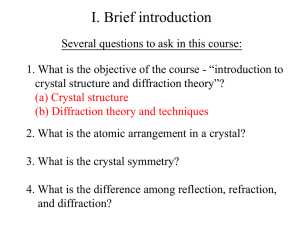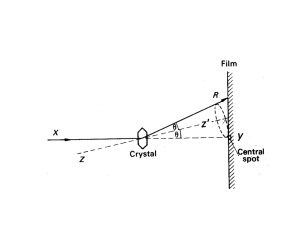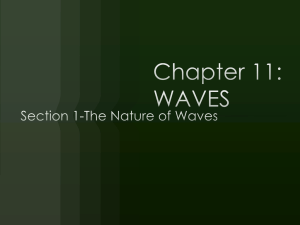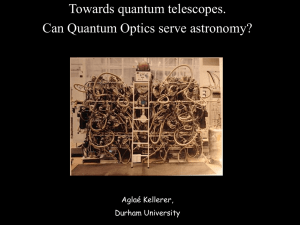Slides - H1
advertisement
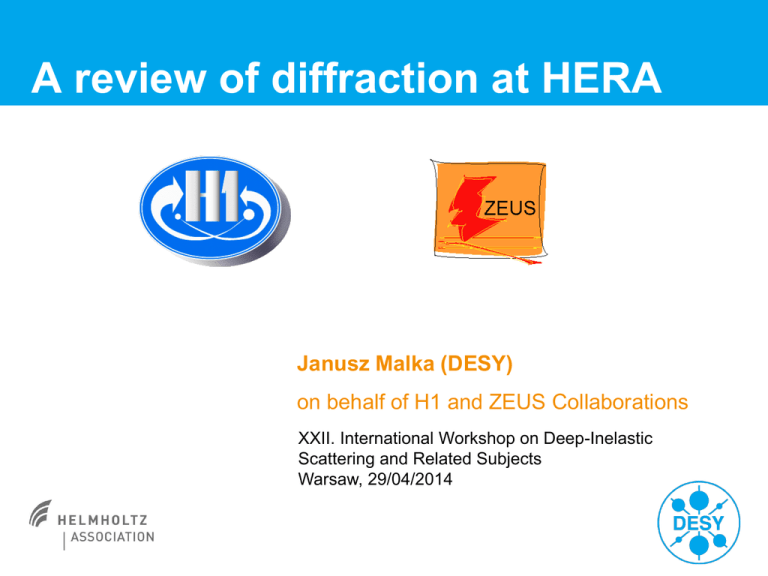
A review of diffraction at HERA Janusz Malka (DESY) on behalf of H1 and ZEUS Collaborations XXII. International Workshop on Deep-Inelastic Scattering and Related Subjects Warsaw, 29/04/2014 HERA ep collider (1992 – 2007) > The world’s only electron/positron-proton collider at DESY, Hamburg > Ee = 27.6 GeV, Ep = 920 GeV (820, 460, 575 GeV) > Two collider experiments: H1 and ZEUS > total luminosity ~ 0.5 fb-1per experiment Janusz Malka | A review of diffraction at HERA | 29/04/14 | Page 2 Physics Letters B 315 (1993) 481-493 21 years of diffraction @ HERA > First observation of events with a Large Rapidity Gap in DIS at HERA > An object carrying the quantum numbers of vacuum is exchanged between * and p: Pomeron Janusz Malka | A review of diffraction at HERA | 29/04/14 | Page 3 Diffractive scattering Deep Inelastic Scattering (DIS) Diffractive Scattering (DDIS) Q2 = -q2 - virtuality of the photon xIP fraction of proton’s momentum of Q2 0 photoproduction, Q2 0 DIS the colour singlet system W photon-proton CME t = (p-p’)2 4-momentum transfer squared at proton vertex x Bjorken-x: fraction of proton’s momentum carried by struck quark = x/xIP fraction of IP carried by the quark “seen” by photon y = Pq/Pk inelasticity Janusz Malka | A review of diffraction at HERA | 29/04/14 | Page 4 Experimental Methods > Large Rapidity Gap: contains proton dissociative background high statistics > proton spectrometer: clean measurement p-tagging no proton dissociative background low statistics VFPS Janusz Malka | A review of diffraction at HERA | 29/04/14 | Page 5 Diffractive Structure Function Measurements FPS VFPS LRG > Experimental summary of H1 F2D measurements > The data compare well with H1 Fit B prediction Janusz Malka | A review of diffraction at HERA | 29/04/14 | Page 6 Diffractive cross section > In analogy to the inclusive DIS cross section, the inclusive diffractive cross section: > reduced diffractive cross section is: > Integrate over t when proton is not tagged rD(4) (,Q2,xIP) > rD(4) F2D(4) at low and medium y > rD(4) = F2D(4) if FLD(4) = 0 Janusz Malka | A review of diffraction at HERA | 29/04/14 | Page 7 Eur. Phys. J. C72 (2012) 2175 HERA combined inclusive diffractive cross sections > Proton spectrometers to detect the leading protons > First combined inclusive diffractive cross sections: H1: EPJ C71 (2011) 1578 H1: EPJ C48 (2006) 749 ZEUS: Nucl. Phys B816 (2009) 1 ZEUS: EPJ C38 (2004) 43 > The input data are consistent with 2min/ndof = 133/161 > Total uncertainty on cross section is 6% for the most precise points Janusz Malka | A review of diffraction at HERA | 29/04/14 | Page 8 Eur. Phys. J. C72 (2012) 2175 HERA combined inclusive diffractive cross sections > The combination results in more precise results and > wide kinematic range: 2.5 Q2 200 GeV2 0.0018 0.816 0.00035 xIP 0.09 0.09 l t l 0.55 GeV2 > The results provide the most precise determination of the absolute normalisation of epeXp cross section Janusz Malka | A review of diffraction at HERA | 29/04/14 | Page 9 EPJ C72 (2012) 2074 Inclusive Diffractive DIS at HERA > Combined H1 measurements > LRG method > Increase in statistics > reduction of uncertainties > the dipole model can describe the low Q2 kinematic domain better than H1 DPDF fits. > DPDF fits are more successful to describe the region of high Q2 Janusz Malka | A review of diffraction at HERA | 29/04/14 | Page 10 Factorisation > QCD factorisation - rigorously proven DPDFs – obey DGLAP, universal for diff. ep DIS hard scattering cross section > proton vertex factorisation - conjecture pomeron flux factor pomeron PDF Janusz Malka | A review of diffraction at HERA | 29/04/14 | Page 11 R.Zlebcik,K.Cerny,A.Valkarova,EPJ C71, (2011) 1741 Diffractive PDFs > DPDFs obtained by H1 and ZEUS from inclusive, dijet > z - the longitudinal four-momentum fraction of the parton entering the hard sub-process with respect to pomeron Janusz Malka | A review of diffraction at HERA | 29/04/14 | Page 12 EPJ C72 (2012) 2074 Inclusive Diffractive DIS at HERA: Pomeron Trajectory IP(0) = 1.113 0.002 (exp)+0.029-0.015 (mod) parameterised > No Q2 dependence observed > Agreement with previous measurements > Consisted with “soft” pomeron > Supports proton vertex factorisation Janusz Malka | A review of diffraction at HERA | 29/04/14 | Page 13 EPJ C72 (2012) 1970 Nucl. Physics B 831 (2010) 1-25 Diffractive dijets in DIS > two hard scales in the process: the virtuality of the photon the transverse energy of the jets > sensitivity to the gluon given by the production mechanism of the dijets Boson-Gluon Fusion processes > The dijets in DDIS as a benchmark for the dPDFs and the factorisation theorem > Supports universality of DPDFs > The dijets data can be used to constrain the dPDFs in a combined with the inclusive data Janusz Malka | A review of diffraction at HERA | 29/04/14 | Page 14 Diffractive dijets in PhP > For dijet in DIS: the factorisation holds > For dijets in PhP HERA results not fully decisive different phase space different selection of PhP tagged electron H1 vs. untagged ZEUS > factorisation breaking observed by H1 but not observed by ZEUS > in p − p collisions (TeVatron) the factorisation is broken > real photon (Q2 ≃ 0) can develop a hadronic structure > resolved photoproduction theory predicts suppression > the suppression is supposed to be stronger at low scales and low x, > however no dependence of suppression-factor visible Janusz Malka | A review of diffraction at HERA | 29/04/14 | Page 15 Eur. Phys. J. C 51 (2007) 301-315 Diffractive photoproduction of D∗±(2010) at HERA > Charm provides a hard scale, ensuring the applicability of pQCD even for low Q2 > mainly via direct photon reactions > is sensitive to the gluon content of the diffractive exchange > The NLO QCD calculations reproduce the xIP differential cross section in both shape and normalization. > Supports the QCD factorisation theorem in diffraction, implying the universality of diffractive PDFs > Large experimental and theoretical uncertainties > Fraction RD is approximately independent of Q2 Janusz Malka | A review of diffraction at HERA | 29/04/14 | Page 16 Vector Meson production Janusz Malka | A review of diffraction at HERA | 29/04/14 | Page 17 Vector Meson production > Soft physics: Vector Dominace Model, Regge theory > In presence of a hard scale (MVM, Q2, t) calculations in pQCD are possible Janusz Malka | A review of diffraction at HERA | 29/04/14 | Page 18 Vector Meson production: W-dependence > The cross section dependence on W can be parameterised as: Wp Janusz Malka | A review of diffraction at HERA | 29/04/14 | Page 19 Vector Meson production: W-dependence photoproduction > The cross section dependence on W can be parameterised as: Wp > The rapid rise of cross section with Wp , can be explain by increasing gluon density with decreasing of fractional momentum x 1/Wp2 Janusz Malka | A review of diffraction at HERA | 29/04/14 | Page 20 Vector Meson production: W-dependence electroproduction (DIS) photoproduction > The cross section dependence on W can be parameterised as: Wp > The rapid rise of cross section with Wp , can be explain by increasing gluon density with decreasing of fractional momentum x 1/Wp2 Janusz Malka | A review of diffraction at HERA | 29/04/14 | Page 21 Elastic and p-diss cross sections as a function of Wp Phys. J. C73 (2013) 2466 > Fit model: Parametrisation (for elastic and p-diss.): σ = N (Wγp / W0 )δ with W0 = 90GeV > Simultaneous fit of elastic and p-diss cross sections: including correlations, including previous H1 hep-ex/0510016 > Results: p J/p: el = 0.67 0.03 p J/Y: pd = 0.42 0.05 el = pd - el : -0.25 0.06 > A dependence of cross section ratio as a function of Wγp is observed Janusz Malka | A review of diffraction at HERA | 29/04/14 | Page 22 Phys. J. C73 (2013) 2466 Comparison to other experiments > H1 measurement in the transition region from fixed target to previous HERA data > Good agreement with previous HERA measurements > Fixed target data: steeper slope, lower normalization > Fit to H1 data extrapolated to higher Wp describes the LHCb data > LO and NLO fit to previous J/ψ data and extrapolated to higher Wp. Janusz Malka | A review of diffraction at HERA | 29/04/14 | Page 23 Phys. J. C73 (2013) 2466 p-diss cross sections as a function of t > The t-dependence of elastic cross section carries information about the transverse size of the interaction region elastic: > p-diss cross section dominant for t > 1 GeV2 p-diss: > Results: HE: p J/p: bel = (4.88 0.15) GeV-2 p J/Y: bpd = (1.79 0.12) GeV-2 n = 3.58 0.15 > The new data extend the reach to small values of |t| > Good agreement in overlap region Janusz Malka | A review of diffraction at HERA | 29/04/14 | Page 24 VM production and DVCS: b(Q2+M2VM) Phys.Lett.B 708 (2012) 14 > Analysis doubles the explored range > In agreement with an asymptotic behaviour of Q2 + M2VM > In optical model approach: b (R2p + R2VM)/4 > The first measurement of b-slop: b = 4.3 +2.0-1.2+0.5 -0.6 GeV-2 > consistent with predictions based on pQCD models (b= 3.68 GeV-2) Cox, Forshaw, Sandapen, JHEP 0906 (2009) 034 > size of interaction region is getting smaller with Q2 + M2VM Janusz Malka | A review of diffraction at HERA | 29/04/14 | Page 25 Summary > HERA delivers diffractive results since 21 years with many interesting measurements using different experimental methods, and more ... Session: Small-x, Diffraction and Vector Mesons: Marcin Guzik (ZEUS): Exclusive dijet production in diffractive deep inelastic scattering at HERA Jan Olsson (H1): Analysis of Feynman Scaling in Photon and Neutron Production in the Very Forward Direction in Deep-Inelastic Scattering at HERA Radek Zlebcik (H1): Diffractive Dijet Production with Leading Proton in ep Collisions at HERA Sergey Levonian (H1): Exclusive Photoproduction of Rho Meson with Leading Neutron at HERA Boris Pokorny (H1): Dijet production with large rapidity gap in deep-inelastic scattering at HERA Session: Heavy Flavours: Nataliia Kovalchuk (ZEUS): Recent results on Charmonium production at HERA Janusz Malka | A review of diffraction at HERA | 29/04/14 | Page 26 Summary > Combined spectrometer data provide better precision > Hard diffraction is present, dominated by gluons > Inclusive Diffraction measurements support proton vertex factorisation > Diffractive factorisation confirmed by dijet measurements in DIS > The suppression that takes place for the dijet diffractive photoproduction is not yet understood > NLO QCD calculations provides good description of open charm php data > Vector meson production provides opportunity to test the property of diffraction and proton structure Janusz Malka | A review of diffraction at HERA | 29/04/14 | Page 27 21 years of diffraction @ HERA Thank you for attention Janusz Malka | A review of diffraction at HERA | 29/04/14 | Page 28
